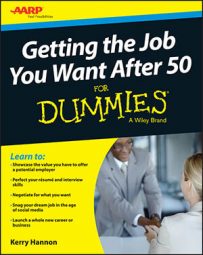Copyright © 2015 AARP. All rights reserved.
After you’ve served in the military, you’d think that employers would be tripping over themselves to hire you. After all, you served your country, you’re obviously a team player, you probably received specialized training, you traveled, you’ve gained valuable life experience, and you have a track record of “sticking with it.” The reality, however, is that many employers are reluctant to hire veterans for several reasons:
Fear/stigma: Some employers fear that veterans have higher incidents of post-traumatic stress disorder (PTSD) and suicide than the general population or have other undisclosed physical or mental illnesses that may compromise their ability to perform the required job duties.
Misplaced beliefs: Some employers mistakenly believe that veterans require closer supervision and more direction than other candidates, because they’ve been accustomed to “following orders.”
Inability to recognize transferrable skills: Employers may not understand how artillery experience makes you qualified for their current openings, for example.
Concern over future deployments: Unless you’re in active reserves, this shouldn’t be a concern, but some employers who see “veteran” on a job application may automatically assume that there’s a possibility you’ll be called to serve, and they’ll need to scramble to fill your position.
As employers find out more about the value of hiring veterans, they’re becoming more open to the idea, but you should still keep these points in mind as you apply for jobs and send out résumés.
Getting help through American Corporate Partners
The nonprofit veterans mentoring program American Corporate Partners is dedicated to assisting veterans in their transition from the armed services to the civilian workforce. ACP offers veterans tools for career growth through mentoring, career counseling, and networking opportunities.
ACP’s mentoring program is open to all currently serving and recently separated veterans (including members of the Reserve and National Guard) who have served on active duty for at least 180 days since September 11, 2001. ACP’s mentoring program is also open to spouses of veterans killed on duty and spouses of severely wounded post-9/11 veterans.
Unlike traditional “wisdom of the crowd” sites such as Yahoo! Answers or Ask.com, the volunteer contributors on ACP’s bulletin board are highly credentialed and vetted beforehand.
Checking out job sites for veterans
There are several job-search sites are devoted exclusively to helping veterans, including the following:
FedsHireVets is a one-stop resource for veterans and their family members to find out more about jobs with the federal government. Here, you can find out whether you’re eligible for Veteran’s Preference, which gives veterans an edge over non-veterans. You must still apply for the position at USAJobs.gov.
Hire Heroes USA has a team of former military and business professionals that teach veterans self-marketing skills and provide each veteran dedicated career coaching and workshops. The site also contains a link to the Hire Heroes USA job board, where you can search for jobs by title, key words, company name, and location. The organization partners with more than 200 veteran-friendly companies.
Hire Veterans enables you to search for jobs, post your résumé, and find out about job fairs for veterans. Employers and recruiters are encouraged to post jobs and search for résumés to find veterans to fill positions.
Military.com is the largest military and veteran membership organization, connecting service members, military families, and veterans to government benefits that include career and educational opportunities.
MilitaryHire enables you to post your résumé, so you can be discovered by employers and recruiters looking to hire veterans. This site also provides a job-search tool and career resources.
U.S. Department of Labor Veterans’ Employment and Training Services features links to find a job, look into apprenticeship opportunities, find out about programs and services, and obtain special assistance if you’re a female veteran.
U.S. Department of Veterans Affairs Employment Services provides résumé builders, career-assessment tools, and job banks. If you need additional training, you can find out about education and training programs and support for veterans.
Transition Assistance Online is a resource for transitioning service members, reservists, guardsmen, veterans, and their spouses from active military duty to the civilian workforce. It provides content on the transition process and related topics, along with a full service job board. All services for job seekers are free.
VetJobs is a leading military job board, sponsored by the Veterans of Foreign Wars (VFW). VetJobs is for all transitioning military, veterans, Department of Defense (DOD) civilians, and their family members.
Confronting the unique challenges of a female veteran
If you’re a female veteran, you qualify for special assistance. Check out Joining Forces Mentoring Plus, a group tailored to women veterans, military spouses, and caregivers of wounded warriors. The Business and Professional Women’s Foundation is the organization behind the mentoring program, which provides unlimited free online career development tools and resources to participants.
The organization has a particularly impressive toolkit for women. The group does everything from tracking down ways to pay college tuition for learning new skills to identifying successful female mentors who’ll hone your career objectives and package your talents so you can find a great job or start a successful business.
Knowing where to look
You may want to look for career fairs and networking opportunities and check out veteran-friendly employers.
The Military Officers Association of America hosts military career fairs around the country and has a job board on its website as well as an interactive tool to help you prepare for interviews and tips for tracking down the job you want. It also has a LinkedIn Career Networking group.
These career fairs feature several career-planning seminars to help military personnel tackle the challenge of transitioning to work life after the military. The seminars include
Network Your Way to Employment
Federal Job Application Preparation
LinkedIn Best Practices
Be Your Own Boss! Exploring Entrepreneurship
You can find a long list of companies that have committed to hiring veterans at Whitehouse.gov.

